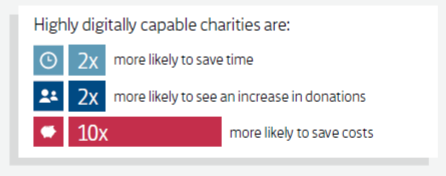This morning I attended the launch of the Lloyds Business Digital Index , the bank’s 4th yearly report into where charities and SMEs are at with digital. We were delighted to contribute to and be a partner on the report, which is the biggest one undertaken so far. Congratulations to the Lloyds Bank Digital Inclusion team who have done a superb job pulling the report and a great launch event together.
The key issue that the report highlights is that both the charity and SME sectors are becoming polarised, with digitally skilled organisations increasingly moving ahead whilst others are left behind.
Here are my highlights from the report.
Progress made
- Charities with the highest digital capability have increased by 3% to 21%. Compared to 2014 when the Index first launched, the number of charities with high digital capability has grown more than 5 times.
- Since 2014, there are now 5 times the number of charities with advanced digital skills
- 20% of charities are on the cusp of achieving full basic digital skills
- Digitally mature charities are also twice as likely to report an increase in donations, with social media proving vital- charities using it report a 51% increase.
- Highly digitally capable charities are 10 times more likely to save money from being online.
- Digitally skilled charities are able to save a day a week thanks to digital capabilities.
- Interesting stat from SMEs- digital leaders were 3 times as likely to have increased their turnover. What are the implications for charity CEOs?
- 69% of the most digitally advanced charities also take advantage of simplified processes around taking payments and donations, translating into greater ability to manage cash flow and spend
- The most digital charities are 5 times as likely to invest in digital skills, indicating that they are keen to retain the competitive advantage they’ve gained
Room for improvement:
- More than 100,000 charities do not have basic digital skills. The number of charities with low digital capabilities has grown from 12% to 16% (for small businesses, this bracket grew from 7% to 9% year on year)
- One-third of charities don’t see being online as relevant. As Leigh Smyth from Lloyds Banking Group said at the launch, mindset is now as big a barrier as skillset
- 75% of charities feel they do not have the skills to protect themselves from fraud and scams
- The number of organisations with all 5 Basic Digital Skills has decreased. Only 48% of charities have full Basic Digital Skills, down from 51% last year. This is compared to 59% of small businesses who have Basic Digital Skills, compared with 62% in 2016.
- Since the first Index in 2014, the difference in Index score between small and larger charities has widened from a 3 point difference in 2014 to an 8 point difference in 2017
- 50% of charity leaders lack confidence in introducing digital change. Having trustees who are confident with digital could bolster this
- Only 58% of charity leaders have got the knowledge or experience needed to help their charity become more digital
- Less than half of charities are using social media to engage with donors and volunteers
- 89% of charities are not using online analytics; this is a decrease from 94% in 2016
- 81% of charities are not investing any of their budget in digital skills
- Older charities are less likely to have digital capability than those set up in the last 10 years. To me this indicates how older organisations can be hampered by legacy as well as other factors
My key takeaways:
- Charities with the highest digital capabilities have grown, and these organisations will save time and money and are seeing the positive impact on their fundraising
- It is a huge concern however that charities with low digital capabilities have risen
- This alongside the other data indicates that we are becoming a more divided sector, as those who are digitally mature progress, and those who don’t risk becoming obsolete
- In this day and age, I’m worried that 1 in 3 charities don’t see being online as relevant.
- Many of the speakers this morning talked about the need for government, SME and charity leaders to inspire organisations into digital change. The right mindset begins with motivation
- The charity sector needs to reappraise the vital role of skills. Learning and development isn’t something which sits in a silo. It impacts productivity and will help charities increase their social impact and develop their staff, so that we can all achieve more
Read the Lloyds Business Digital Index 2017

